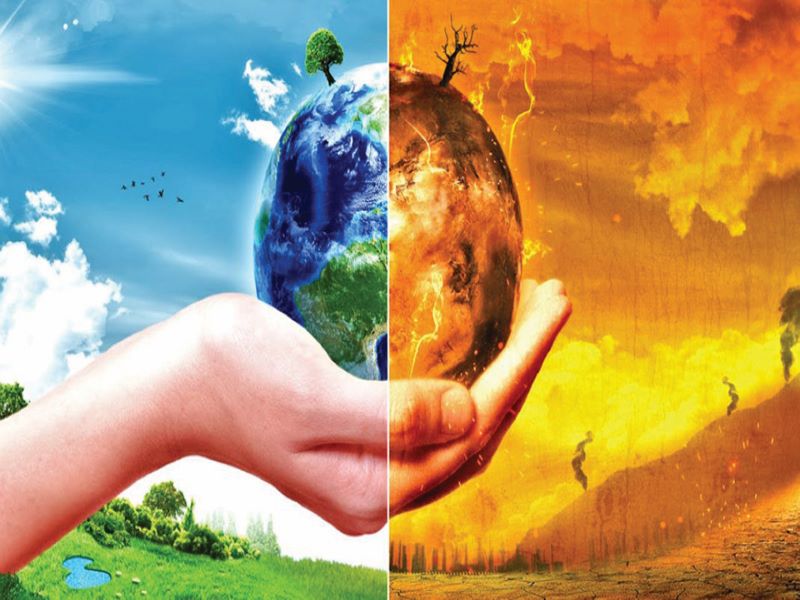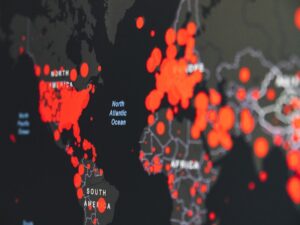July 2019 is set to be the hottest month ever measured on Earth. This isn’t a freak occurrence. Trends are going one way. The last 5 years have been the hottest ever recorded. The world is heating up and humans are the cause. A transformation of the natural world is now upon us. The fear is that the changes will be so transformative they will lead to a climate crisis that threatens civilisation.
While a transformation of the environment is inevitable, what’s not is how extreme the transformation will be. Human emissions of greenhouse gases are linked to a changing climate. The more we can limit emissions, the less of an impact we’ll have on the natural world. Our destiny is still in our hands. We still have time to limit the impacts of the transformation. We have two options. The option we choose will determine the course of humanity. No pressure then.
Addicted to fossil fuels
It’s important to recognise that the climate crisis is an effect of a problem. The cause is our economic system. In fact, since 1988 100 companies have been responsible for over 70% of the world’s greenhouse gas emissions. If we want to stop the effect of the problem, we need to stop the cause. It seems simple. But these companies are powerful. They value short term profit over the long term well-being of humanity. As their self-interest lies in continuing to emit harmful greenhouse gases, they use their power to exert political influence to maintain the status quo.
“If fossil fuels continue to be extracted at the same rate over the next 28 years as they were between 1988 and 2017…global average temperatures would be on course to rise by 4C by the end of the century.”
This will have catastrophic consequences.
Transformatisation
Transformatisation is a process where we continue on the path of business as usual. Dismissing the alarm bells, we remain reliant on fossil fuels to power our economy deep into the twenty-first century. Efforts are made to adapt to the transformation, but these are small changes, not really conducive to solving the challenges lying ahead. The changes are rooted in a desire to provide an illusion of change while maintaining the same economic structure that is creating the problem.
This path will lead to an aggressive transformation of the climate system. This will result in disorder and chaos as societies will be ill-equipped to adjust to the extremes created by the climate crisis.
As the environment around us turns ever more hostile countries and communities will become increasingly merciless in an attempt to protect precious resources. Civil society will break down, and anarchy will ensue. Any kind of moral compass will be disregarded in a desperate struggle to maintain a semblance of decency in an inhospitable world.
The longer we remain on our current path, the worse the climate crisis will be. This path will result in a transformation that will traumatise humanity.
Not fit for purpose
Powerful people with vested interests in our current way of doing things have no interest in adapting in line with the transformation to our climate system. Why would they? If your power is rooted in the current way of doing things, to adapt would be to give up that power base. Why do you think climate deniers are a thing? Denying there is a problem sows seeds of doubt in people’s minds, legitimising the need to carry on as we are.
The current political framework is intertwined with our current way of doing things. Like those powerful companies it has no interest in wholesale change, but small changes that don’t help to solve the problem. It would be naïve to think the current political framework has the will, or ability to implement the changes necessary to transform our economy and society. If we want to live harmoniously in a world that is going to transform, we need to take positive action to transform in parallel with the changes taking place.
Transformaction
Transformaction is a process where people recognise we still have a window of opportunity to redesign our economic and social systems to better prepare for what’s to come. A crucial step is to treat the crisis with the respect it deserves. This is an emergency and requires urgency. The process also involves rejecting the current political framework. This framework isn’t fit for purpose to create momentum around a transformation necessary to avert a crisis.
We still have the ability to control our own destiny. If change is going to come it will be through the will of the people. The problem requires a global movement united by a common agenda. A vision of the future that provides direction and hope that we can transform to prepare for the challenges ahead. A movement united by solidarity and a desire to find solutions to the climate crisis.
To do this, our economic and social systems must be radically transformed. This feels like a monumental undertaking, but humans can achieve remarkable things when they are united by a shared cause. Gandhi’s philosophy of civil disobedience that led to the fall of the British empire in India is an example of the power of a group united by a shared desire.
Transformaction involves people taking control of their own destiny. It involves people taking positive action to build an economy and society that places the natural world at its heart.
We must reject the illusion that the current system creating the problem can now find solutions to the problems it has created. These problems are systemic. To solve the problem we need to change the system. If we choose the path of transformaction it will symbolise a rejection of the current systems ability to solve the crisis. We must choose the course of action if we have any hope of transforming.
Transformatisation vs Transformaction
If we think about the two paths, transformatisation takes us further away from the balance in the natural world. A balance that has allowed us to thrive as a species. Transformaction looks to reverse the damage and bring us back towards a balance with the natural world. The choice is ours. At present, I’m not optimistic we’ll be able to move away from our current path and create the transformation that’s necessary to bring us closer to balance.
There are far too many powerful people with vested interests in the current way of doing things. Their shortsightedness, greed and addiction to the accumulation of wealth are to everyone’s detriment.
If we fail to manage the transformation it will be the most traumatic experience humanity could ever face. I assume most people don’t want that. So let’s choose action. Let’s take control of the situation and develop an economy and society that flourish in harmony with nature. If we can we might be able to prepare for the transformation that is coming our way. The trauma caused by inaction isn’t worth thinking about.




I like your articles
Thanks, Douglas!